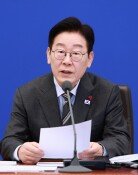Won-Dollar Rate Breaks 1,200 Mark, Causing Panic
Won-Dollar Rate Breaks 1,200 Mark, Causing Panic
Posted September. 30, 2008 08:29,
The foreign exchange market went into a panic yesterday as the won-dollar rate broke the 1,200 level at one point.
Foreign exchange authorities verbally intervened in the market in the morning, saying the rate fluctuated seriously. They also sold dollars in the afternoon to prevent a further drop in the won.
The rate began soaring immediately after the market opened, with the dollar rapidly appreciating against major currencies due to the U.S. financial bailout plan and worry over Korea`s lack of dollar liquidity.
Market players said Korea Export Insurance Corp. purchased a considerable amount of dollars to minimize its foreign exchange losses and banks also struggled to buy dollars.
Jeon Jong-woo, managing director of Standard Chartered First Bank Korea, said, The market is burdened by groundless worry and a mob psychology. Even exporters are not selling dollars. The sharper the won-dollar rate grows, the more it is likely to plunge.
Foreign exchange experts say worry over dollar supply and demand amid Koreas current account deficit is the main reason behind the serious fluctuation of the foreign exchange rate. Uncertainty in the global financial market has fueled worry over Koreas dollar liquidity.
Over the first eight months of this year, Korea recorded a trade deficit of 11.57 billion dollars. In domestic stock markets, foreign net selling reached 32.4 trillion won (27.3 billion dollars) between January and this month.
Jeon Seung-ji of Samsung Futures said, Exporters used to sell dollars at the end of a month. But they`re purchasing more dollars instead of selling partly because of the growing trade deficit.
The Korean governments announcement to inject more than 10 billion dollars of foreign exchange equalization funds into the market also contributed to raising volatility in the spot market. The decision spurred experts to predict no more active intervention in the spot market due to a feared reduction of foreign exchange reserves.
With the won approaching 1,200 per dollar, certain experts warned that the weakening Korean currency will burden smaller companies with KIKO (knock-in, knock-out) contracts and put inflationary pressure on the economy.
Under the KIKO contracts, exporters must sell dollars amounting up to three times the contract amount when the exchange rate surpasses a preset mark. In a survey conducted by the Korea Federation of Small and Medium Business, 70 of 102 firms signing KIKO contracts said they will likely to face bankruptcy if the exchange rate surpasses 1,200.
The weakening won also negatively affected the stock market. Koreas benchmark KOSPI dropped 19.97 points (1.35 percent) from Friday to close at 1,456.36. The tech-heavy KOSDAQ fell 2.29 points (0.51 percent) to finish at 446.05.
parky@donga.com jefflee@donga.com





![“한동훈, 정치생명 걸고 무소속 출마해 평가받는 것 고려할만”[정치를 부탁해]](https://dimg.donga.com/c/138/175/90/1/wps/NEWS/IMAGE/2026/01/19/133186982.1.jpg)

